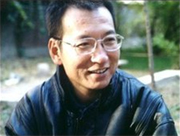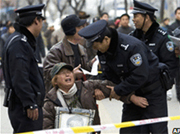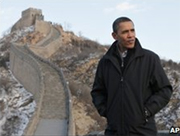
Mr Liu has been a political activist for more than two decades

Protests are not uncommon in China

Will President Obama have any future influence with China's leaders? |
 No respite for China's human rights dissidents No respite for China's human rights dissidents
The case of former university professor and human rights activist Liu Xiaobo, 53, who has spent most of the past 20 years in jail or under house arrest, reveals much about what is going on beneath the glossy surface of the new China, Quentin Sommerville explains.
Liu Xiaobo's wife, Liu Xia, pulled a handkerchief from her thick winter coat and sighed. "We are living a life basically without freedom. "Right now Liu Xiaobo has no freedom at all, not even a tiny bit," she said, her voice cracking.
Her husband is facing up to 15 years in prison if convicted of fresh charges for "inciting subversion of the Chinese state". He has been detained for a year this time, and she has grown thin.
Liu Xiaobo's crime was to publish a democratic manifesto, Charter 08. It calls for freedom of expression, multi-party elections, independent courts and for the military to be answerable to the government and not the Communist Party.
More than 300 people, academics and writers, signed it.
Party domination
China's courts are under the total control of the party, so it is almost certain that Liu Xiaobo will be convicted.
When President Obama visited China last month, he took a soft approach to human rights.
But he did present China with a list of cases that the US was concerned about, it is thought that Mr Liu's name was on it.
But China ignored Mr Obama, and less than a month later, the state pushed ahead with its prosecution of Mr Liu. Before, when US presidents and other world leaders visited, China would often release a dissident.
Around the time of President Bush's visit in 2005, Wang Wanxing was released from 13 years detention. When President Clinton visited, Wang Dan, one of the Tiananmen protesters, was set free. But now, China no longer needs to worry about what the West thinks.
It was President Clinton who said human rights should not be allowed to interfere with relations with China.
Beijing took this to heart, because if there are no adverse consequences, why bow to western pressure? Human rights in China are supposed to be improving.
It was thought the Olympics would make things better, prosperity would make things better, and leaving China to move at its own pace would make things better. But human rights and legal reforms are moving backwards, not forward. China is a country ruled by law, the government likes to claim. Except, it is not. Wang Shengjun is the chief justice, but he has never been to law school. However, he does have excellent contacts within the Communist Party.
And he has been a very loyal cadre, halting years of legal reform by telling China's judiciary to reject the concept of independent courts. Instead they should consider Communist Party interests first, then the people's interests, and finally constitutional law. Despite the wishes of radicals like Liu Xiaobo, since Tiananmen, there has not been much appetite here for democratic reform. People have grown richer, and are largely content under the Communist Party's rule. But ordinary people, hardly what you would call political radicals, have grown hungry for legal rights, and progress was made in creating an independent and professional judiciary. That has now stopped.
Lawless land
What does it mean to live in a country without law? It means that the parents of the schoolchildren who died in the Sichuan earthquake will never get their day in court. It means that people poisoned by China's filthy factories have never been able to sue. That farmers robbed of their land by corrupted officials are left destitute. And it means living in fear, which drives people to desperation. In Chengdu, Sichuan, 47-year-old Tang Fuzhen tried to stop the local government from demolishing her home. But the bulldozers and demolition crews arrived early one morning.
She could take no more, so she covered herself in petrol and set herself alight. She later died in hospital.
Eight of her family members, including her husband and son were then detained for "disrupting government work". Across China, those who are frustrated by corruption or injustice are taking to the streets. They did so on the island of Xiamen to stop a chemical plant being built near their homes; in Shanghai it was the threat of a new railway line; in Guangdong, to protest a planned waste incinerator.
And in each case it was the middle class, the newly rich, those who had benefited from the party's rule, who took to the streets. With no faith in the courts, they had little choice but to take direct action. As I was leaving her, Liu Xia turned and said: "It's written in our constitution that freedom of speech is a right of people. "But Liu Xiaobo said a few words, and now he's a criminal. So you tell me, who is this Chinese Constitution written for? I do not know."
(BBC NEWS) |







